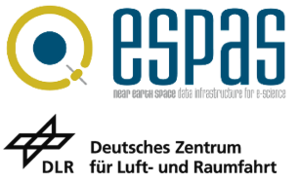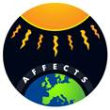Completed Projects
In past, IMPC and its predecessor have been involved in a number of projects. A subset of these projects is presented here.
Expert Service Centre Ionospheric Weather - Definition and Development

Within the Space Situation Awareness (SSA) programme, ESA is currently developing a Space Weather (SWE) Network consisting of five Expert Service Centres (ESC), the SSA SWE Coordination Centre (SSCC) and the SWE Data Centre. The Expert Service Centre Ionospheric Weather (I-ESC) will be coordinated by DLR.
Swarm Utilisation Analysis (SUA)

SUA is an activity in period 2 of the ESA SSA Programme (P2-SWE-XVI). It investigates the applicability of products derived from the ESA Swarm mission for the ESA Space Weather Network. In its role as I-ESC coordinator, the IMPC-Team is involved as consultant in this project.
MONITOR

The main goal of MONitoring of the Ionosphere by innovative Techniques, coordinated Observations and Resources (MONITOR) is to design, develop, deploy and operate a system for collection, processing and archiving of ionospheric observation data.
MuSIK

The project "Multi-Scale Ionosphere Model from Combination of Modern Satellite observation Techniques" (MuSIK) is a first step in developing a mathematical-physical model of the ionospheric electron density distribution. Thus, the long-term development of a data driven physical ionospheric model will be prepared.
SOFIE

The objective of the SOlar Flares detected by Ionospheric Effects (SOFIE) project is to detect solar flare events(sfe) by continuously measuring the intensity of VLF radio signals and observing ionospheric propagation effects on radio waves. Apart from possible signal interferences, the recorded signal strength maps directly the temporal variation of solar flares, with a remarkable precision. So, by simple measurements of the signal strength at the carrier frequency, it is possible to detect and monitor solar flares, which are often a precursor of space weather storms. SOFIE as an educational project does not only address interesting scientific problems, but also has great potential to teach the basics of scientific work to pupils.
ESPAS

The Near Earth Space data infrastructure for e-science (ESPAS) project has built an e-Infrastructure that will help scientists and engineers to locate observational data from ground-based and space borne sensors and from models that can advance studies of the near-Earth space environment, and its adverse impact on advanced technologies.
AFFECTS

The objective of the project "Advanced forecast for ensuring communications through space" (AFFECTS), which is led by the Georg-August Universität Göttingen, is to set up a high quality forecast system for predicting strong space weather effects.
PRE-EARTHQUAKES

The project “Processing Russian and European EARTH observations for earthQUAKE precursors Studies" (PRE-EARTHQUAKES) intends to commit EU and Russian researchers to integrate different observational data and to improve, by cross validating, their methodologies.
TRANSMIT

Training Research and Applications Network to Support the Mitigation of Ionospheric Threats (TRANSMIT) did exploit the existing specialised European science base and take advantage of insight and full commitment from European industry and relevant end users. TRANSMIT focuses on the training that is urgently needed to establish a real time system that will address a technological issue of importance to a range of European services and applications.
